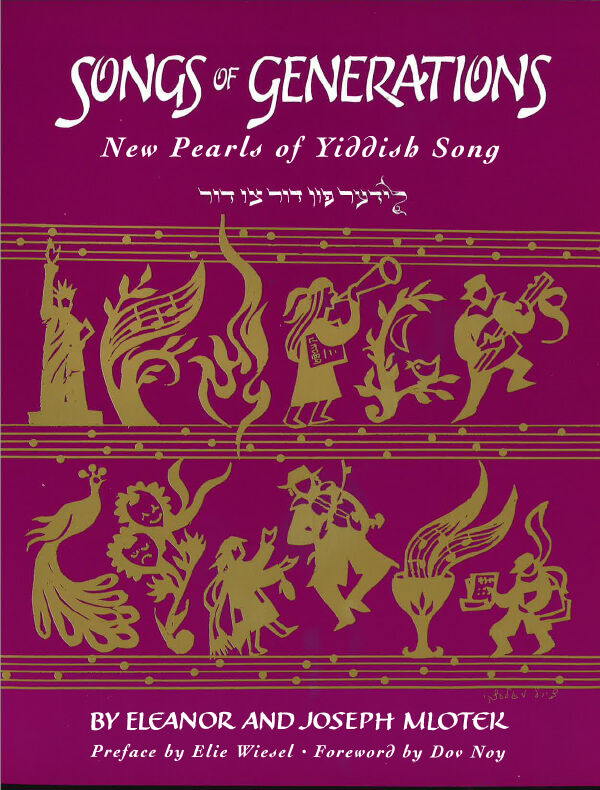Words and music by Solomon Smulewitz [Small] (1868-1943), music by Henry A. Russotto. Published in July, 1912 by the Hebrew Publishing Co. The song was later included in the author’s collected poems Lider (N.Y., 1913), with the omission of the lines about Ida Strauss, who refused to be separated from her husband when the ship went down. On the sheet music the song closes with the lines: “Zoln ern kleyn un groys / Dem nomen Ida Shtroys!” (Let young and old honor the name Ida Strauss!). In the book, the song ends on a moralizing note. Other melodies to the poem were written by Meir Posner and A. Garfinkel, London. The subject of the Titanic tragedy is also represented in Yiddish folksong (see Pearls of Yiddish Song). “The Ballad of the Steamship Titanic”/ “Parakhod Titanik” was recently collected and recorded by Michael Alpert on the cassette of the Brave Old World Klezmer, Ensemble.

Oh! Be sad and have pity
for the great, fresh calamity!
Let the tears multiply
and flow on and on.
Let the rich and poor weep
and not be stingy with their tears
for the deep, watery graves
of the horrible sea.
The ocean has now won
its wild, demonic game,
it swallowed into the abyss
its victims, many lives.
It has shown its power,
Oh, terrible! horrible!
Man, you may do your best
to sharpen your mind,
but you cannot match
the ocean’s strength.
However you try to outsmart it,
it will be the victor.
Here you must lie
in his watery grave.
The joy of those
who embarked on the ship,
on this one, this giant,
to be a passenger.
The Titanic will take them,
seriously, it’s a stroke of luck,
they’ll amuse themselves
with theater, with music.
A bit of comedy,
a lively world;
of course, such a tragedy
no one imagined.
Drowned is the joy,
what remains is the suffering.
Here they stand, in pain,
the thousands in need,
and know that they will be dashed
into the deep by death.
Now they are yelling, “Go save yourselves
in lifeboats, women, quickly!
Let no man dare set foot
into that spot.”
But listen to a woman’s soul
who could then say:
“I will not move from this spot.
I will die here with my husband…”
Let young and old honor
the name of Ida Strauss!
Akh, troyert, badoyert
Dem groysn, frishn brokh!
Zoln trern zikh mern
Un flisn nokh un nokh.
Zoln veynen raykh un orem.
Nit zhaleven keyn trer,
Oyf di tife, nase kvorim
Fun shoyderlekhn mer.
Dem yam iz yetst gelungen
Zayn vilde tayvl-shpil,
In opgrunt hot er farshlungen
Korbones, lebns fil.
Er hot getsaygt zayn kraft,
Akh! Shreklekh! Shoyderhaft!
Refrain:
Mentsh, megst am bestn
Sharfn dayn moyekh,
Kenst zikh nit mestn
Mit dem yams koyekh.
Megst zikh vi klign,
Er iz dir geyver*,
Ot mustu lign
In zayn nasn keyver . . .
Di freydn fun yedn
Vos iz in shit arayn,
Oyf dizn, dem rizn,
A pasazhir tsu zayn.
Titanik vet zey firn,
Keyn shpas, es iz a glik,
Men vet zikh amuzirn
Mit teater, mit muzik.
A regele komedye,
A lebedike velt,
Dokh oyf aza tragedye
Hot zikh keyner forgeshtelt.
Dertrunken iz di freyd,
Geblibn iz di leyd.
Ot shteyen, mit veyen,
Di toyznter in noyt,
Un veysn az shtoysn
Vet zey tsu grunt der toyt.
Ot shrayt men: “Geyt zikh retn
In Shiflekh, froyen, shnel !
Nit vagn zol batretn
Keyn man gor yene shtel.”
Dokh hert a froyen-zele,
Vos ken a zog ton dan:
“lkh gey nit fun der shtele;
lkh shtarb do mit mayn man . . . ”
Zoln ern kleyn un grays •
Dem nomen Ida Shtroys!
* goyver
אָך, טרױערט, באַדזוערט
דעם גרױסן, פֿרישן בראָך!
זאָלן טרערן זיך מערן
און פֿליסן נאָך און נאָך.
זאָלן װײנען רײַך און אָרעם,
ניט זשאַלעװען קײן טרער,
אױף די טיפֿע, נאַסע קבֿרים
פֿון שױדערלעכן מער.
דעם ים איז יעצט געלונגען
זעַן װילדע טײַװל-שפּיל,
אין אָפּגרונט האָט ער פֿאַרשלונגען
קרבנות, לעבנס פֿיל.
ער האָט געצטגט זען קראַפֿט,
אֶך שרעקלעך! שױידערהאַפֿט!
רעפֿרײן:
מענטש, מעגסט אם בעסטן
שאַרפֿן דײַן מוח,
קענסט זיך ניט מעסטן
מיט דעם ימס כּוח.
מעגסט זיך װי קליגן,
ער איז דיר גײװער (גובֿר),
אָט מוזסטו ליגן
אין זן נאַסן קבֿר.
די פֿרײידן פֿון יעדן
װאָס איז אין שיף אַרײַן.
אױף דיזן, דעם ריזן,
אַ פּאַסאַזשיר צו זײַן.
טיטאַניק װעט זײַ פֿירן,
קײן שפּאַס, עס איז אַ גליק,
מען װעט זיך אַמוזירן
מיט טעאַטער, מיט מוזיק.
אַ רעגעלע קאָמעדיע, אַ לעבעדיקע װעלט,
דאָך אױף אַזאַ טראַגעדיע
האָט זיך קײנער פֿאָרגעשטעלט.
דערטרונקען איז די פֿרײד,
געבליבן איז די לײד.
אָט שטײען, מיט װײען,
די טױזנטער אין נױט,
און װײסן אַז שטױסן
װעט זײ צו גרונט דער טױט.
אָט שרײַט מען: ’’גײט זיך רעטן
אין שיפֿלעך, פֿרױען, שנעל!
ניט װאָגן זאָל באַטרעטן
קײן מאַן גאָר יענע שטעל.ײ
דאָך הערט אַ פֿרױען-זעלע,
װאָס קען אַ זאָג טאָן דאַן:
’’איך גײ ניט פֿון דער שטעלע,
איך שטאַרב דאָ מיט מײַן מאַן. . .
זאָלן ערן קלײן און גרױס
דעם נאָמען אטדאַ שטרױס!
Song Title: Khurbn Titanik

The Songs of Generations: New Pearls of Yiddish Song anthology comprises songs that were either never printed before or appeared in rare and inaccessible publications — sometimes in different versions and without proper sources. Most of the songs in this book were submitted by readers of Chana and Yosl’s column “Perl fun der yidisher poezye” (Pearls of Yiddish Poetry) in the Yiddish newspaper Der Forverts (The Forward), initiated in October, 1970. Over 25 years, thousands of songs were collected in correspondence and on cassettes from readers throughout the world, and they represent a veritable national Yiddish song archive. Chana Mlotek, in her introduction, writes, “In the course of years the inquiries, contributions and enthusiasm of these readers have kept our own interest unflagging and have reinforced our dedication to this effort. And in recent years our participants have also been augmented by new readers from the former Soviet Russia, who receive our newspaper there or from newly-arrived immigrants in this country and Israel.”